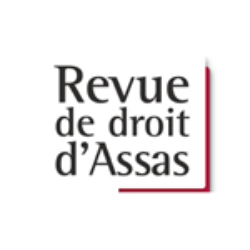
Publications

🌐suivre Marie-Anne Frison-Roche sur LinkedIn
🌐s'abonner à la Newsletter MAFR Regulation, Compliance, Law
____
 ► Référence complète : M.-A. Frison-Roche, Les spécificités à concevoir dans l'audience publique des contentieux systémiques de vigilance, document de travail, novembre 2024.
► Référence complète : M.-A. Frison-Roche, Les spécificités à concevoir dans l'audience publique des contentieux systémiques de vigilance, document de travail, novembre 2024.
____
🧮Ce document de travail a été élaboré pour constituer la base d'une intervention à la conférence Le droit processuel de la vigilance, du 18 novembre 2024
qui fait partie du cycle de conférences sur Le contentieux systémique,
____
📕Ce document de travail sera aussi la base d'une contribution pour l'ouvrage publié en 2025.
____
► Résumé du document de travail : Les réflexions sur la façon dont l'audience doit être spécifiquement conçue lorsque le cas porte sur un contentieux systémique de vigilance portent progressivement sur 5 points. Elles ne développent pas ce qui est commun à toutes les audiences mais ont pour objet ce en quoi précisément cette audience-là pourrait se distinguer des autres audiences, en ce que le cas de vigilance sur le case l'audience se déroule, en ce qu'il est de nature systémique, est de nature différente des autres cas contentieux.
____
En premier lieu, ces contentieux systémiques sont fortement médiatiques, les stratégies des demandeurs consistant ouvertement à concevoir le procès "juridique" comme venant en appui à une demande plus générale de reddition des comptes qui se déroule ailleurs, par exemple sur la scène politique, dans les médias et les réseaux sociaux. C'est pourquoi le caractère public de l'audience est essentiel, parce que le contentieux de Vigilance est un "contentieux public", du début jusqu'à la fin. Les portes doivent en être ouvertes. La menée doit en être pédagogique. Les Régulateurs ont l'habitude de cette dimension pédagogique de leur office. Les juges spécialisés des contentieux systémiques émergents doivent aussi l'avoir.
_____
En deuxième lieu, et cela est directement corrélé, l'audience doit faire place aux "parties à l'instance" au-delà des parties au litige. Il faut revenir à la définition même du contentieux systémique, dont la vigilance est un champ : c'est un cas dans lequel un ou des systèmes sont impliqués, dans un état présent et/ou futur. C'est pourquoi ils doivent être présents. Il doivent être présents à l'audience. Comme un système, par exemple le système, qui constitue "l'arrière-litige" peut-il être présent à l'audience ? Chaque partie au litige va prétendre, l'une et l'autre, qu'elle le représente. Par exemple qu'elle représente les "générations futures", en subjectivisant le système. C'est un point essentiel parce que les systèmes sont plutôt "taisants". Or, comment et qui parle pour les systèmes, surtout s'il ne s'agit pas que des systèmes régulés, s'il s'agit aussi des systèmes sociaux, s'il s'agit des systèmes sociaux des pays dans lesquels les infrastructures contestées se déploient ? L'expression des demandes du système économique et social est l'affaire du ministère public. Pour l'instant il est taisant. Sans doute parce qu'il est davantage dans le Droit pénal. Alors que les causes systémiques, parce qu'elle relève du Droit processuel, même si elles sont portées devant le juge civil, ou commercial, appelle sa présence.
____
En troisième lieu, même si l'on en admet le principe et plus concrètement, encore faut-il déterminer ceux qui peuvent venir parler à l'audience publique d'une façon pertinente pour les systèmes impliqués afin d'expliquer leurs besoins, apparaissant ainsi comme parties à l'instance, comme experts, comme amis du Tribunal. Il y a immédiatement beaucoup de candidats. Plus le juge a de pouvoirs et plus il a d'amis. Les réflexions n'en sont qu'à leurs débuts sur ce point et l'expérience américaine n'est pas forcément un bon guide. Les parties au litige prétendent, l'une et l'autres, être les mieux placées pour exprimer les besoins du systèmes et des personnes qui y sont ou y seront situées. Cela peut être vrai, car avoir un intérêt dans le litige ne signifie pas que l'on ait de ce seul fait tort. Mais cela n'est pas un gage incontestable de pertinence. C'est davantage la différence d'objet qui distingue la partie au litige et la partie à l'instance car le litigant veut gagner alors que celui qui connaît le système peut expliquer celui-ci. Le système n'est pas que technique, comme l'exprime l'intitulé de la Chambre Régulation économique, sociale et environnementale et une question ouverte est celle de savoir qui parle pour le pays dont la "société civile" est peu audible. Dans l'usage procédural des amici curiae auquel cette ouverture de l'audience mène, l'attitude du juge est déterminante : doit-il accueillir les candidatures spontanées, les filtrer ou être le maître des invitations ? Dans une conception où le juge est maître de l'audience, il devrait avoir vocation à être maître des invitations, dans un modèle qui s'ouvre à ce débat au-delà du litige mais qui ne laisse pas les parties maîtresse d'une instance où le sort des systèmes est en jeu.
____
En quatrième lieu, si l'on admet cela et plus concrètement encore, dans la menée de l'audience, longue, orale, contradictoire, pour que des solutions puissent éventuellement se dégager (des médiations sont toujours possibles, des engagements sont toujours possibles), c'est sans doute dans les techniques de l'arbitrage international que l'on peut trouver des solutions spécifiques. Cela peut paraître contre-intuitif puisque l'arbitrage international se déroule plutôt dans l'isolement d'un contrat, dans la confidentialité, tandis que la vigilance peut prétendre prendre en charge avec éclat le destin du monde.... Mais la chambre 5-12 de la Cour d'appel de Paris est en miroir de la chambre internationale. Il faudrait ainsi non seulement admettre que le débat porte aussi sur l'interprétation du Droit, que les avis en Droit ne soit pas seulement par des portes qui demeurent bien étroites des consultations mais soient exposées en public, la prohibition des legal opinions étant préjudiciable dans une branche du Droit en construction, l'absence de questionnement des consultants par le Tribunal et les 2 parties l'étant également. Les avis devant pouvoir porter sur toute question, afin que la technicité de la situation, qui a justifié la spécialisation des juges, via la création des chambres spécialisées, puisse être non seulement exposée et discutée. Il faudrait ainsi que des avis puissent être demandés par le Tribunal sur les effets systémiques (économique, social et environnemental), sur les effets futurs car son office portant sur le futur de tels avis exposés et discutés en public serait d'un grand appui pour lui.
____
🔓lire le document de travail ci-dessous⤵️
Sept. 19, 2014
Thesaurus : Doctrine
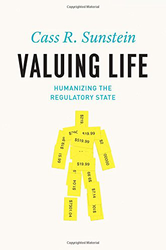
Référence complète : Sunstein, Cass R., Valuing Life. Humanizing the Regulatory State, University of Chicago Press, 2014, 240 p.
Consulter la table des matières.
Lire la quatrième de couverture.
Aug. 31, 2014
Blog
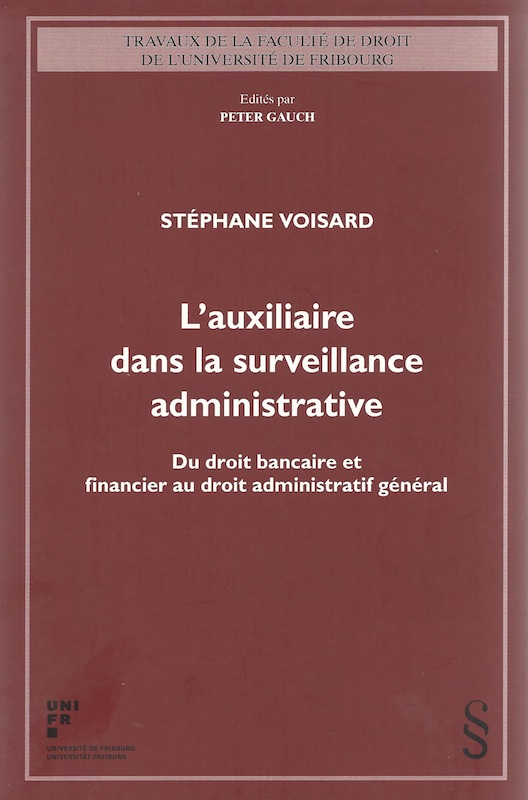 L'ouvrage de Stéphane Voisard est très intéressant car il montre que des personnes privées sont intégrées par la puissance publique pour que le système de supervision des banques soit efficace. Il faut mais il suffit que ces personnes soient des experts fiables et crédibles.
L'ouvrage de Stéphane Voisard est très intéressant car il montre que des personnes privées sont intégrées par la puissance publique pour que le système de supervision des banques soit efficace. Il faut mais il suffit que ces personnes soient des experts fiables et crédibles.
Il montre tout à la fois que c'est une conception assez générale du droit administratif.
Son ouvrage démontre que cet état du droit et de sa pratique dépasse la distinction du droit public et du droit privé.
Updated: July 31, 2013 (Initial publication: Oct. 25, 2011)
Teachings : Les Grandes Questions du Droit, semestre d'automne 2011

Oct. 29, 2012
Publications
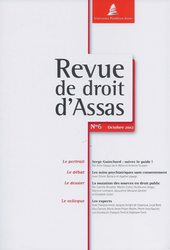
► Référence complète : M.-A. Frison-Roche, "Experts et procédure : l'amicus curiae" ("Experts and procedure: the amicus curiae"), Revue de droit d'Assas, october 2012, pp. 91-94
____
📝read the article (in French)
____
► English Summary of the article: A recent thesis has argued that amicus curiae is becoming a common principle of Procedural Law. This shows its importance. The fact that the mechanism, the character, is designated by a Latin formula leads us to suspect that something is being concealed that legal technique ordinarily forbids: it is the legal expert and the party's expert, which is what the amicus curiae most often is, either one or the other, or both at the same time.
Therefore, removing the prudish cloak of Latin, it is these two difficulties that must be addressed. If we exclude the legal expert, it is because "jura novit curia" ("the court knows Law". But this rule, which recalls the principle that "no one is supposed to be ignorant of the law", merely indicates a sharing of the burden of evoking facts and Law between the parties and the judge (Motulsky) and not a presumption of knowledge. Consequently, the modest, and therefore self-confident, judge has no reason, either psychological or legal, to shy away from a legal expertise.
As for the party's expert, or the judge's expert who is highly influenced by a party, a profession, a social group, in short, a judge's expert who is in fact an expert held by a party, this can only be a problem if the judge cannot keep his distance from this expert whose opinion is biased by the weight of the party.
But first of all, any opinion is biased. Whether it is given in bad faith or good faith, it is biased, and in rhetoric we know that an opinion biased in good faith is more dangerous than a bought opinion, because the latter is known to be twisted by self-interest. In this respect, the person who listens to it, the judge, knows the difference.
Indeed, the legal system that recognises the party's expert and the amicus curiae, i.e. North American Law or European Union Law, draws the necessary procedural consequence: they include the party's expert opinion in the adversarial debate.
It is the principle of adversarial debate, the principle of principles in the conduct of proceedings, that makes amicus curiae acceptable and welcome, since it provides the judge with a scientific input that the latter does not have.
________
April 12, 2012
Conferences
Oct. 18, 2005
Thesaurus : Doctrine
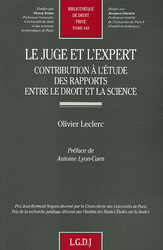
Référence générale: Leclerc, O., Le juge et l’expert. Contribution à l’étude des rapports entre le droit et la science, préface Antoine Lyon-Caen, L.G.D.J, 2005, 468p.
Lire la quatrième de couverture.
Cet ouvrage a été publié à la suite d'une thèse soutenue par l'auteur en 2003.
Dec. 16, 2004
Publications
March 26, 2002
Conferences
May 10, 1995
Publications
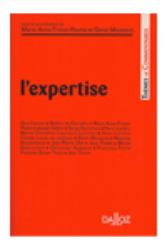
Référence complète : FRISON-ROCHE, Marie-Anne, MAZEAUD, Denis (dir.) L'expertise, coll. "Thèmes et Commentaires", Dalloz, 1995, 143 pages.
Accéder à l'article de Marie-Anne Frison-Roche : La procédure de l'expertise.
